The first page opened with a poem titled "Content," followed by "He Suffered Because He Could Not Speak English," an article about a Kiowa boy who was accused of a crime and could not defend himself. The next article was a treatise on the importance of buying insurance. Page two began with a memorial about General Hancock titled "The Dead Hero…
Apache Prisoners of War (1886-1887)
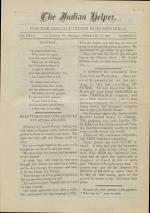
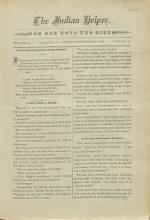
The first page opened with a poem titled "Sound Principle But Poor Poetry," followed by "A Boy Needs a Trade," about the degradation of a ditch digger reprinted from the Detroit Free Press. There was also an article called "A Sick Man who Wanted Whiskey." The second page included a report in the shape of a turkey titled "Our Thanksgiving Turkey…
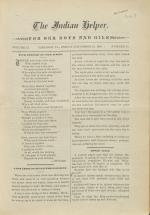
The first page opened with a poem titled "Much Depends on Your Aiming," about keeping to the straight path, followed by "A Boy Froze to Death While On Duty," about the effects of an ice storm on Lake Michigan followed by "Moved Again," in which the Man-on-the-band-stand opined that Indians who are not educated have no say in decisions made…
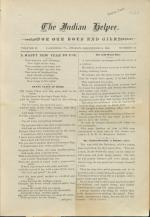
The first page opened with a poem titled "A Happy New Year to You," followed by a poem called "Santa Claus at Home," about his return to the North Pole. The next article, "The Cold Water Man," was about the dangers of drinking beer, reprinted from Maryland Bulletin. Also on the page was a piece titled "Mr. Causes-the-Wind, a Dakota…
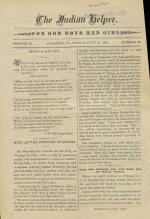
The first page opened with the poem "What a Jug Did," reprinted from An Old Scrap Book followed by a piece called "Nice Letter from Mr. Standing," made up of abstracts from his trip West returning Carlisle students to their home agencies. Standing mentioned there was a special travel car for girls and sick students, and described his…
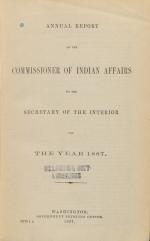
An excerpt from the Annual Report of the Commissioner of Indian Affairs to the Secretary of the Interior for the fiscal year ending 1887, containing the Eighth Annual Report of the Carlisle Indian Industrial School. The report, submitted by Superintendent Richard Henry Pratt, includes a school population table as well as discussions of industry…
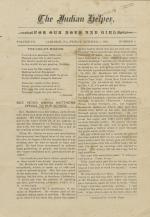
Page one opened with the poem, "The Child's Mission," followed by a report called "Rev. Peter Owaha Matthews Speaks to Our School," which was continued on the fourth page. It was the account of an assimilated Indian and the trials he overcame to become a successful, educated professional. Page two contained news of the literary and…
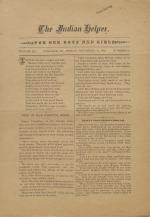
The first page opened with an untitled poem about kindness, followed by "Part of Our Hospital Work," a reprint of a composition by Nancy Cornelius (Oneida) who detailed her experiences as a hospital assistant. She wrote about the breakfast routine and the Apache mothers caring for their babies at the hospital. There was also an article…
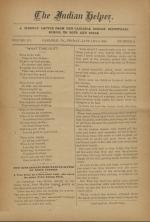
The first page opened with a poem, "What Time Is It?" followed by the story of Indian women whose harvested cache of vegetables had been stolen. The story was titled, "How Some Indians Were Made to Suffer by Their Enemies: A True Story by a Dear, Kind Lady Who Lived For Many Years Among Them." It was signed by A-TE-KA, aka "Aunt Martha," as…
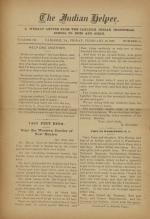
The first page opened with a poem, "Help One Another," reprinted from "Chambers, Journal;" followed by "7482 Feet High," a letter to the Man-on-the-Band-Stand from M. Burgess, about her journey to California. This page also began a letter from Peoria student Edith Abner, entitled "Visit to Washington D.C." which continued on the fourth page.…
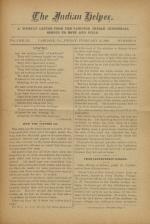
The first page opened with a poem, "Sowing," followed by the article, "How the Letters Go," that described the process of express mail retrieval and distribution from trains. Then came a letter from former student John Dixon [Dickson] (Pueblo) who wrote about his experiences translating for and recruiting students for the Albuquerque Indian…
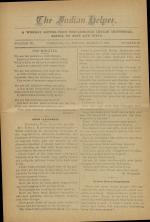
The first page opened with a poem, "The Minutes," followed by Marianna Burgess' letter "From California," to the Man-on-the-Band-Stand describing idyllic weather compared to what she's hearing of blizzard conditions at the school. The second page began with an account of the visit and talk by Mr. Kanzo Uchumiura, a Japanese student visiting the…
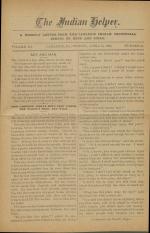
The first page opened with a poem, "Boy and Man," followed by "Two Carlisle Indian Boys Stop Under the Walnut Tree, and Talk," contrasting an honest, hard working boy to a lazy, ungrateful boy. It continued on the fourth page. Page two featured news and greetings from returned students, an article "School Room Sentences," that encouraged…
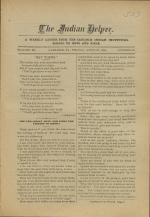
The first page opened with a poem, "Get There," followed by an editorial from Ethildred B Barry of Germantown, called "Are the Indian Boys and Girls the Friends of Birds?," on the treatment of birds. It continued on the fourth page. Page two opened with a piece describing the contents of the April "Red Man," a report from Susan Longstreth…
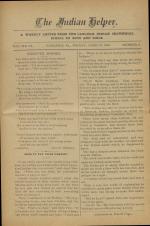
The first page opened with a poem by John G. Whittier, "Granted Wishes," followed by Aunt Martha's story, "Does It Pay to Be Unkind?" about a former Carlisle student's lack of cooperation by not translating business dealings from English after returning home. The second page featured news items about returned students, and a report about "The…
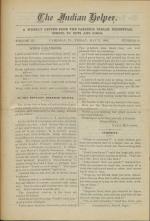
The first page opened with a poem "Work a Blessing," followed by a letter "To the Republic Debating Society," from Nancy McIntosh (Creek) reporting her position as teacher in Eufala, Indian Territory. The last article on this page was entitled "Curiosity," which continued on page four. Page two listed many small news items about returned…
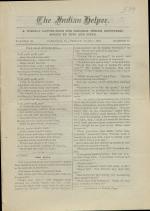
The first page opened with a poem, "The Old Steam Mill," followed by a fictitious conversation between two Carlisle Indian School students, Tom and Ben discussing the merits of work and study. It continued on page four. Page two included news from Pine Ridge Agency, and of the Standing family’s trip to Liverpool, the value of repeating unknown…
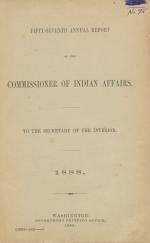
An excerpt from the Annual Report of the Commissioner of Indian Affairs to the Secretary of the Interior for the fiscal year ending 1888, containing the Ninth Annual Report of the Carlisle Indian Industrial School. The report, submitted by Superintendent Richard Henry Pratt, includes a school population table as well as discussions of industry…
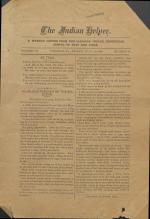
The first page opened with the poem “Be True” followed by an article titled “A Carlisle Teacher on the Big Ocean,” about a trip aboard the Steamer Aurania dated July 6th, 1888 written for the Man-on-the-band-stand by “A Carlisle,” aka Miss Lowe. The article concluded on the fourth page. Page two featured a variety of small newsy paragraphs that…
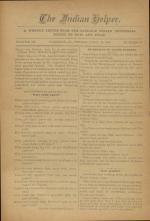
The first page opened with the death notice for Katie Kinshone, one of the Apache babies. It was followed by a poem by Henry Sargent Blake called “Why Come They?” The next item was an article, “No Tobacco in Other Schools,” about the evils of tobacco use and the last piece on the page was an excerpt from an Oneida boy’s outing letter called “…
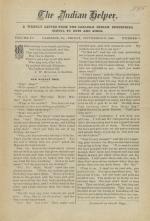
The first page opened with an untitled poem by J. W. Burgess reprinted from Sunshine, followed by “Our Walnut Tree” about the Man-On-the-Band-Stand’s efforts to keep students from picking green walnuts. The second page began with “The Captain,” which described the speech Capt. Pratt made during the student assembly explaining his work…
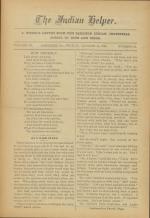
The first page opened with a poem "Our Orderly,” about a seven-year-old Apache boy. The next article, “On A Band Stand,” was about children telling stories on the band stand, which continued on the fourth page. Page two opened with excerpts of letters “From the Out Pupils,” followed by the Saturday evening chapel program that featured Mr.…
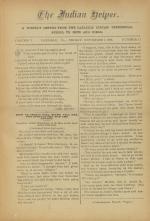
The first page opened with a poem by Ella Wheeler with the first line "Oh What Am I but an Engine Shod” followed by the next installment of the series titled “How An Indian Girl Might Tell Her Own Story if She Had the Chance: Founded on Actual Observations of the Man-on-the-band-stand’s Chief Clerk” (continued from the previous week). The story…
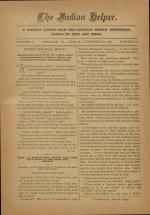
The first page opened with a poem by E.G. titled "After Carlisle, What?” followed by the next installment of the series titled “How An Indian Girl Might Tell Her Own Story if She Had the Chance: Founded on Actual Observations of the Man-on-the-band-stand’s Chief Clerk” (continued from the previous week). The story continued on the fourth page.…
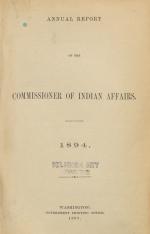
An excerpt from the Annual Report of the Commissioner of Indian Affairs to the Secretary of the Interior for the fiscal year ending 1894, containing the Fifteenth Annual Report of the Carlisle Indian Industrial School. The report, submitted by Superintendent Richard Henry Pratt, includes a table of the school's population, as well as…
